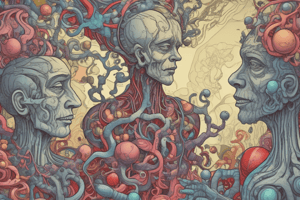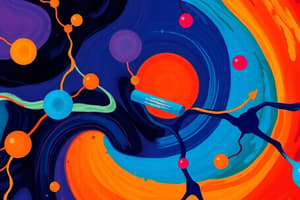Podcast
Questions and Answers
What is the duration of the action of atropine as a mydriatic and cycloplegic?
What is the duration of the action of atropine as a mydriatic and cycloplegic?
- 5-7 days
- 10-14 days
- 7-10 days (correct)
- 3-5 days
Why is atropine used as preanaesthetic medication?
Why is atropine used as preanaesthetic medication?
- To decrease the effect of general anaesthetics
- To prevent nausea and vomiting
- To prevent vagal bradycardia during anaesthesia (correct)
- To increase respiratory secretions
What is atropine used to treat due to increased vagal activity?
What is atropine used to treat due to increased vagal activity?
- Sinus bradycardia and partial heart block (correct)
- Hypertension
- Tachycardia
- Hypotension
What is a side effect of atropine?
What is a side effect of atropine?
What is ipratropium used for?
What is ipratropium used for?
What is the general term for agents that bind to cholinoceptors and prevent the effects of acetylcholine?
What is the general term for agents that bind to cholinoceptors and prevent the effects of acetylcholine?
Which type of cholinergic antagonist drug does not block nicotinic receptors?
Which type of cholinergic antagonist drug does not block nicotinic receptors?
What is the effect of low doses of atropine on heart rate?
What is the effect of low doses of atropine on heart rate?
What is the effect of atropine on body secretions?
What is the effect of atropine on body secretions?
What is the duration of atropine's general actions?
What is the duration of atropine's general actions?
Flashcards are hidden until you start studying
Study Notes
Cholinergic Antagonists
- Cholinergic antagonists bind to cholinoceptors and prevent the effects of acetylcholine (ACh) and other cholinergic agonists.
- There are three types of cholinergic antagonist drugs: antimuscarinic agents, ganglionic blockers, and neuromuscular-blocking agents.
Antimuscarinic Agents
- Antimuscarinic agents block muscarinic receptors, causing inhibition of muscarinic functions.
- They do not block nicotinic receptors, and therefore have little or no action at skeletal neuromuscular junctions (NMJs).
Atropine (Antimuscarinic Agent)
- Atropine is an alkaloid with a high affinity for muscarinic receptors.
- It binds competitively and prevents ACh from binding to muscarinic receptors.
- Atropine acts both centrally and peripherally, with general actions lasting about 4 hours.
- Effects of atropine:
- CNS: confusion, delirium
- GI: decrease motility and acid secretions (without interfering with hydrochloric secretion)
- Heart rate: increase at high doses, decrease at low doses
- Body secretions: decrease saliva, bronchial secretions, and sweat (leading to elevated body temperature)
- Eye: mydriasis (cycloplegic), allowing for measurement of refractive errors without interference by the accommodative capacity of the eye
Therapeutic Uses of Atropine
- As a mydriatic and cycloplegic: used topically for producing mydriasis and cycloplegia, lasting 7-10 days
- As a preanaesthetic medication:
- Preventing vagal bradycardia during anaesthesia
- Preventing laryngospasm by decreasing respiratory secretions
- Acting as an antisecretory agent to block secretions in the upper and lower respiratory tracts before surgery
- As an antispasmodic: useful in dysmenorrhoea, intestinal and renal colic
- In poisoning:
- Life-saving drug in organophosphorous poisoning
- Drug of choice in some types of mushroom poisoning
- Used in curare poisoning with neostigmine to counteract the muscarinic effects of neostigmine
- As a vagolytic: used to treat sinus bradycardia and partial heart block due to increased vagal activity
Side Effects of Atropine
- Blurred vision
- Decreased secretions
- Hyperthermia
- Constipation
- Urinary retention
- Delirium
- Hallucinations
Studying That Suits You
Use AI to generate personalized quizzes and flashcards to suit your learning preferences.




